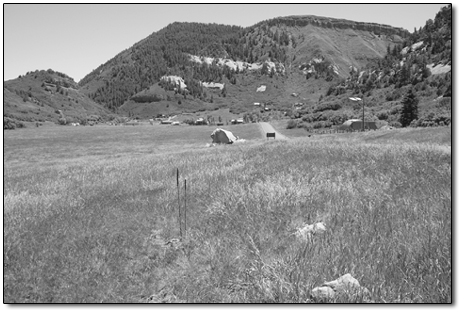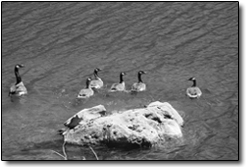|
|
||||
|
Open space tax collection set to begin Actual purchases or improvements unlikely until 2006 SideStory: A menu of open space options
by Missy Votel After a previously failed attempt in 2001 and a successful but somewhat contentious effort this spring, local open space advocates will soon have their wish of a dedicated fund for parks, open space and trails. Starting July 1, the City of Durango will raise sales tax from 7.4 percent to 7.9 percent in response to last April’s voter-approved Ballot Question 2A. Half of the proceeds from the tax will go toward parks, open space and trails acquisition and preservation while the other half will go toward funding a new library and other capital improvements. The half-cent sales tax is expected to bring in between $2.5 million to $3 million annually, with a cap of $3.5 million per year. It will sunset in 2025. “The tax starts July 1, so go buy things now,” said a joking Director of Parks and Recreation Cathy Metz on Monday. Metz oversees the city’s Open Space, Recreation, and Parks and Forestry advisory boards, which were instrumental in forwarding the idea of a sales tax increase last summer. The tax increase was later tied to a new library and capital improvement fund and placed on last April’s city ballot. It passed with a 10 percent margin. In November 2001, a proposed 2 percent use tax, which would have funded open space as well as affordable housing, was soundly defeated in a countywide vote. While local residents may be anxious to finally get the ball rolling on acquiring dwindling parcels of natural lands, Metz said it will still be several months before that can happen. “It’s going to take some time for the money to accumulate,” she said. “I expect 2006 will be the first expenditure out of the account.” City Finance Director Sherry Eilbes, who will be managing the account, said money actually won’t start trickling in until August, once July sales taxes have been collected. She also noted that money probably won’t be allocated until the city approves its 2006 budget toward the end of the year. “We’ll adopt the 2006 budget some time in December, and at that point, we’ll have an idea of what we’ll be spending,” she said. Both Metz and Eilbes pointed out that there’s a possibility that no money will be spent out of the fund in 2006. “Spending depends on whether or not any open space parcels become available,” Eilbes said. Metz said it is this flexibility, which opponents charged was a “blank check” for the city, that makes it so appropriate for parks, open space and trails, or POST, needs. “We don’t necessarily have to spend anything in 2006,” she said. “It can just sit and earn interest and be ready for a project when it comes up. That’s the good thing about it.” Another piece of the puzzle that has yet to fall into place is the composition of a citizens advisory committee, which will oversee how the funds are spent. The group will make project recommendations to the City Council, which will have the final say on the matter.
Another piece of the puzzle that has yet to fall into place is the composition of a citizens advisory committee, which will oversee how the funds are spent. The group will make project recommendations to the City Council, which will have the final say on the matter. So far, the city’s three POST advisory boards have forwarded their recommendations on how the five-member board should look. More than likely the new board will be made up of members of these three boards, or representatives of their respective interests, as well 4 as representation from the community at large. Mayor Dale Garland said the City Council is still mulling the structure of the board and hopes to have a definitive answer by the end of the year. “Each advisory board made a different recommendation,” he said “There’s not a consensus yet on the makeup. Whether it will include an active member of each advisory board or not has yet to be determined.” Nevertheless, Metz said all three boards are dedicated to finding the right mix and seeing work begin. “I think they’re awfully excited to get this project off the ground,” she said. Open Space Advisory Board member Bill Manning said he has been encouraged by the selection process thus far and is optimistic for the future. “The City Council has helped by throwing out several different options for the makeup,” he said. “I’m encouraged that there’s going to be plenty of citizen involvement.” Manning, who’s also director of Trails 2000, said although no specific projects have been lined up, he is most looking forward to the prospects of preserving open space in Horse Gulch. “The open space I’m most excited about is the potential to preserve additional land in Horse Gulch,” he said. “I’m also glad we’re moving ahead on the library and pedestrian and safety issues with the help of 2A money.” Manning also spoke to the loose structure of the fund, saying it is not a carte blanche but rather the only way of ensuring that the fund changes with the community’s needs. “I think the flexibility is needed,” he said. “There’s no way of knowing what our community’s priorities will be in 20 years. This will help the community spend money in priority ways.” However, like Metz, he said he believes people must be patient when it comes to seeing results. “As the funds trickle in, it will accumulate to big money over the years,” he said. “But I believe strongly that this money will benefit Durango, and even though it costs us a small amount, our community will benefit beyond the cost. “It gives us a great bang for the buck.” •
|
In this week's issue...
- May 15, 2025
- End of the trail
Despite tariff pause, Colorado bike company can’t hang on through supply chain chaos
- May 8, 2025
- Shared pain
Dismal trend highlights need to cut usage in Upper Basin, too
- April 24, 2025
- A tale of two bills
Nuclear gets all the hype, but optimizing infrastructure will have bigger impact



